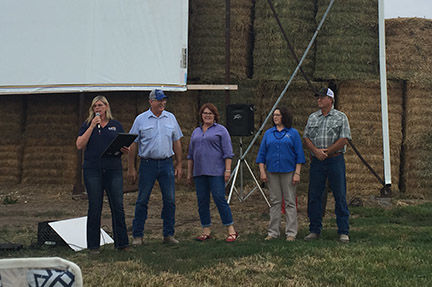Sustainability has always been a priority at Hiland Dairy Foods Company, which continuously seeks new ways to recycle, reduce and reuse at its production plants. Hiland Dairy’s most extensive effort to date took years to reach its current magnitude as a closed-loop sustainability initiative at the company’s plant in Chandler, Oklahoma. At the recent ProFood Live conference in Chicago, Hiland’s initiative received a ProFood World Sustainability Excellence in Manufacturing Award.
Hiland Dairy received the second-place award in the project category for the Chandler plant’s whey recycling and wastewater treatment facility, which has expanded over the years to include additional projects.
Whey wastewater, a byproduct of cottage cheese production, must undergo treatment, which was expensive for Hiland Dairy and taxing on the City of Chandler’s municipal treatment facilities.
“We started looking at building our own wastewater treatment facility in Chandler,” said David Smith, operations manager at Hiland Dairy. “We purchased 620 acres of land near the plant for a whey recycling and wastewater treatment facility. We have lagoons that use aerobic bacteria to treat about 250,000 gallons of wastewater a day. Then we have the aeration and holding ponds, which, together, hold 28 million gallons.”
To recycle the whey, Hiland separates it from the water. The water goes to the treatment facility, and the whey is filtered into a silo and held until the Chandler team applies it as fertilizer through irrigation pivots.
The treatment facility sits on 280 acres, and Hiland uses the surplus acreage to grow high-yield feed crops, irrigated with the treated wastewater and fertilized with the recycled whey. These crops provide area farmers with an affordable, local feed source.
The Chandler plant also produces Hiland’s Red Diamond Tea, which inspired its most recent project under this sustainability initiative.
“We’re very conscious of the amount of landfill waste that results from manufacturing,” Smith said. “To reduce our landfill waste, we looked at ways we could recycle the used tea bags. We had them tested and found out they’re rich in nitrogen, phosphorous and potassium.”
With that revelation, a solution emerged: The Chandler team could use the tea bags to fertilize the overworked, now-barren 340 acres outside the irrigation system’s reach.
“We purchased the machinery to grind up and spread the tea bags,” Smith said, “and we started by spreading crushed tea bags across 60 acres,” Smith said. “Then we performed regular soil sampling and testing, which showed definite improvement in the soil quality. That allowed us to plant high-quality, high-yield forage crops that are easy for livestock to digest and provide area farmers with an affordable feed source.”
The results of the closed-loop sustainability initiative show the tangible significance of Hiland’s Chandler initiative. The plant reduced its amount of wastewater by 95 percent. Landfill waste was reduced by 194 tons a month. During growing season, the plant produces 1.75 tons of feed a day. And those are only a few of many notable results.
“At Hiland Dairy, we’ve made investments to take the three biggest wastes out of the plant and put them to work revitalizing the land,” Smith said. “To be a part of such an enormous effort and see it not only succeed on a local level but also earn national recognition is incredible. It makes me proud to work for a company that’s dedicated to innovation like Hiland is.”


